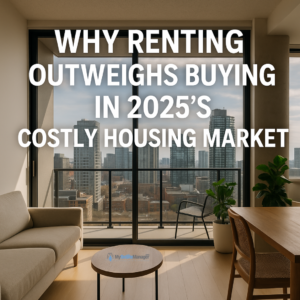As we reach the halfway mark of 2025, one of the most critical financial questions facing millions of Americans remains: Is it smarter to rent or buy a home right now?
Traditionally, homeownership was seen as a cornerstone of financial stability a symbol of the American dream. But today’s economic landscape has dramatically shifted that equation. According to recent analysis by AInvest, a combination of soaring home prices, elevated mortgage rates, and evolving investment opportunities is pushing both individuals and investors to reconsider the long-standing preference for ownership.
Let’s dive into the data driving this shift and why many are choosing to rent instead of buy.
The Mortgage Rate Squeeze: Ownership Has Never Been More Expensive
Mortgage rates remain stubbornly high in 2025, with the average 30-year fixed rate hovering around 6.85%. Even as inflation shows signs of easing, the Federal Reserve’s rate hikes continue to keep borrowing costs elevated.
For homebuyers, this means monthly payments have ballooned especially in high-demand markets:
-
San Francisco:
-
Median home price: $915,000
-
Monthly mortgage (with 6.85% rate): ~$8,486
-
Average rent: ~$3,024
-
Buy-to-rent ratio: 180% meaning it costs nearly twice as much to own than rent.
-
-
Seattle:
-
Median home price: $920,000
-
Monthly mortgage: ~$7,965
-
Average rent: ~$3,537
-
Buy-to-rent ratio: 125%
-
In simple terms: for every dollar a renter pays, a homeowner is often paying $1.80 in mortgage and related costs for the same property. This extreme imbalance is forcing many would-be buyers to stay on the sidelines.
Hidden Costs: The “True Price” of Owning
Even beyond the mortgage payment itself, homeownership carries a host of additional expenses:
-
Property taxes
-
Homeowner’s insurance
-
HOA dues (in many communities)
-
Routine maintenance & repairs
(averaging roughly $2,000/year, and often much higher for older properties)
These hidden costs add up quickly, eroding the equity-building appeal of ownership. Renters, by contrast, have far more predictable housing costs and avoid surprise repair bills or unexpected tax hikes.
Equity Isn’t Growing Fast Enough to Offset the Cost
A major selling point for homeownership has always been equity growth building wealth as home values rise. However, price appreciation has slowed compared to the boom years of 2020–2022.
For example:
-
In Seattle, home prices are growing at a modest 4.5% annually.
-
After factoring in mortgage interest, taxes, and maintenance, homeowners may find that much of their monthly payment is going toward non-equity expenses.
-
Meanwhile, renters who invest their savings from lower monthly payments can often outperform housing returns particularly if invested in diversified portfolios or rental-focused investments.
According to AInvest’s data, renters in high-cost cities are saving an average of $1,519/month compared to homeowners. That’s money that can be invested in stock markets, bonds, retirement accounts, or real estate investment trusts (REITs).
Investors Are Shifting to Rental Real Estate and REITs
It’s not just everyday renters who are rethinking homeownership investors are pivoting, too.
-
Multifamily rental properties are seeing high occupancy rates:
-
For example, BSR Realty Trust reports a 95.7% occupancy rate with cap rates averaging 5.7% making multifamily assets more attractive than volatile office or retail properties.
-
-
REITs (Real Estate Investment Trusts) offer another compelling option:
-
Dividend yields around 4.1%, with potential for capital appreciation.
-
REIT ETFs (such as IYR or VNQ) provide liquidity and diversification that direct homeownership does not.
-
The rental sector’s stability, combined with strong demand from a growing renter population, is drawing both institutional and individual investors toward these more flexible and resilient real estate plays.
Flexibility and Liquidity: Renting’s Underrated Advantage
Perhaps the biggest advantage renters enjoy in 2025 is flexibility.
-
They’re not locked into a 30-year financial commitment.
-
They can move more easily for career, family, or lifestyle changes.
-
They can invest saved capital elsewhere, keeping their financial portfolio diversified.
In an uncertain economy where job mobility, remote work, and lifestyle shifts remain common, the ability to pivot without selling a home or navigating a tight real estate market is highly valuable.
Summary: Renting Wins the Numbers Game (For Now)
| Factor | Buying | Renting |
|---|---|---|
| Monthly Payment | High (due to mortgage, taxes, insurance) | Lower & predictable |
| Flexibility | Limited | High |
| Equity Growth | Slower than previous years | Can invest saved money elsewhere |
| Hidden Costs | High | Minimal |
| Liquidity | Low | High |
| Investment Alternatives | Tied to property value | REITs, stocks, diversified investments |
Conclusion: 2025 Is the Year of the Renter
The traditional narrative that “renting is throwing money away” is being challenged by cold, hard numbers. In many of today’s biggest housing markets, renting provides not just affordability, but a financial edge allowing people to build wealth through investments rather than illiquid home equity.
As Oliver Blake of AInvest writes, “In today’s housing market, the question isn’t ‘Should I buy?’ but rather ‘Why would I?’”
Source:
“Renting vs. Owning a Home in 2025: A Data‑Driven Investment Shift” – AInvest (June 11, 2025)
Read the full article here

